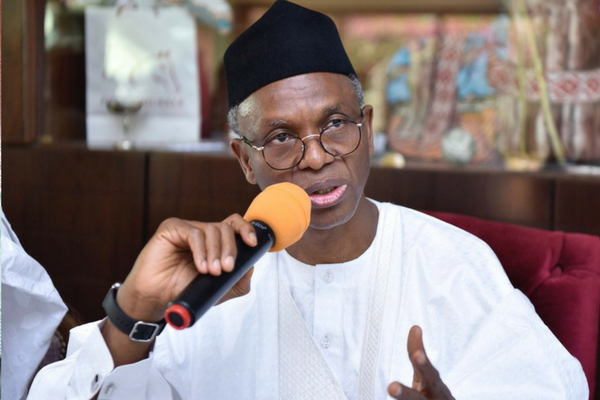What’s newly biting with state legislators’ fixation about financial security at public expense after leaving office, such that they are randomly levying the common treasury with self-serving demands for life pensions? I guess we need to ask.
And the bug seems to be catching on. Whereas most states of the Nigerian federation are yet wrestling with absorbing the new minimum wage for workers, the craving for life pension by lawmakers is on a mission creep and may soon swamp us with legislations that deeply mortgage the national economy. And you would hardly know before the deed is done. For instance, a variant of a proposed law that was lately shot down in Bayelsa State in the storm of public odium that the very idea incurred is now nestling after-the-fact in the statute books of Kano State almost without a whimper. From the way it played out in Kano, it’s all down to mutually rewarding tag teaming between a house of assembly and respective state governor to swing the deal.
The Kano State legislature had last week passed the Pensions Rights of Speaker and Deputy Law 2019, which guarantees the house of assembly speaker and deputy speaker pension for life after they leave office. They will as well be treated to annual medical trip abroad, plus a brand new car every four years at the public’s expense. The catch is, this deal is already law because it’s been given assent by State Governor Abdullahi Ganduje.
Sponsored by Municipal house member, Baffa Baba Dangundi, the new law benchmarks affected ex-officials’ benefits with the emoluments of serving office holders. “There shall be paid pension…equal to the emoluments of a serving speaker and deputy speaker, provided that either the speaker or the deputy do not hold any paid elective or selective appointment,” it stipulates.
Advertisement
There are conditions attached, though: “Any person duly elected as speaker or deputy speaker shall, on completion of his term be entitled to a grant of pension for life by the state, provided that such person was not removed from office through impeachment by members of the house of assembly,” the law states.
It adds: “Where the speaker or deputy vacates office before the expiration of the term of his office, not as a result of impeachment, he shall be paid pension pro-rata the number of years he spent in relation to his tenure of office. Where the speaker or deputy speaker dies in office before the expiration of the term of his tenure, he shall be paid pension pro-rata the number of years he spent in relation to his tenure of office.”
Additional perks are on offer for concerned ex-officials under the new law, which BBC World News, in a report last week, said Assembly Speaker Kabiru Alhassan Rurum justified as being aimed at minimising corruption and preventing politicians from facing hardships when they leave office. “There shall be provided for the speaker and the deputy speaker a brand new vehicle to be bought by the state government every four years. There shall be provided for the speaker and the deputy speaker medical expenses either at home or abroad, depending on the nature of the illness,” the law prescribes.
Advertisement
Late in April, the Bayelsa State assembly had speed-passed a similar bill approving life pension for all past and current members of that legislature. The proposed law, which was sponsored by House Leader Peter Akpe, prescribed N500,000 monthly pension for life for everyone who has held the office of speaker, N200,000 for every deputy speaker and N100,000 for every other house member. Only that the legislation met with fierce headwinds of public rebuff that obviously forced the hand of State Governor Seriake Dickson to decline assent. The difference with Kano is that Governor Ganduje swiftly assented to that state’s version last week, almost without the public’s attention.
When the Bayelsa assembly threw up its bill for Governor Dickson’s approval, labour and civil society groups, among many others, pitched in fiercely against the law and urged the governor to decline assent. One of the groups, the Socio-Economic Rights and Accountability Project (SERAP), described the bill as an abuse of legislative function by Bayelsa lawmakers, saying: “Rather than sponsoring bills that would improve access of children in Bayelsa to quality education, the lawmakers are taking advantage of their entrusted public positions to propose a bill to collect large severance benefits.” It indeed threatened to institute court proceedings “to challenge the legality of the legislation and ensure full compliance with constitutional provisions and Nigeria’s international anti-corruption obligations,” should the governor give it his approval. Among others, the Trade Union Congress of Nigeria (TUC) also described the assembly’s passage of the bill as the height of impunity, an insult and a deliberate attempt to widen the scope of fraudulent activities by politicians in the state.
Following that outrage Dickson, in declining assent to the controversial bill, said it was inconsistent with Section 124 of the 1999 Constitution of the Federal Republic of Nigeria, as amended. He argued that the assembly lacked powers to expand the categories of public servants who should be entitled to pension, adding that there were many challenges facing the state and that if allowed to become law, Bayelsa would be the only entity out of Nigeria’s 36 states to come up with such a legislation. He further said he was guided in his decision by the principle that government shouldn’t be for a select class of the privileged in the society. Many would swear the Bayelsa governor sweated to pacify the legislators, with whom he is known to have very friendly ties, on the public imperative of burying the ill-conceived law.
But where Bayelsa failed, Kano has prospected and effectively birthed a close variant of the same species of legislation. Of course, it isn’t that the Kano State law is less odious: though it is overtly limited to the assembly speaker and deputy speaker, you could bet it is only a matter of time before something is minted to cater for other house members. Neither is it that the new Kano law is untainted by those legal and moral objections raised by Dickson in rejecting the Bayelsa law, because they are basically and essentially of the same kind. No, it wasn’t a matter of any difference in legislative DNA but a matter of tack.
Advertisement
The Kano political elite smoke-screened both the passage of the pension bill by the state assembly and the governor’s speedy assent with a more contentious and monumental legislation, namely the Kano Emirs Appointment and Deposition Amendment Law 2019 that fractured the historical Emirate into five components and decimated the authority of Emir Muhammadu Sanusi II. The said law, which was instigated by a private sole petitioner, took all of three days to be initiated, processed and ratified by the assembly, and was so much in sync with the governor’s fancies that he pledged his assent ahead of the bill’s passage. And when the bill was eventually signed into law, it was in a cohort of six other bills, of which the pension bill was one. You could see designs of a tradeoff between the governor and legislators: Mr. Governor gets his way with the Kano Emirate, courtesy of the assembly’s pliancy, while the assembly gets its payback with the pension law. Everybody is happy!
But while the pension law may be expedient for Kano leaders, they should search their consciences whether it is what the state really needs. For a state officially reckoned the most populous in Nigeria where the World Poverty Clock says some 91million have fallen into extreme poverty – implying that the most populous state may well have the lion’s share – and where a don of Bayero University Kano (BUK), Professor Murtala Sagagi, recently said more than 4million persons were jobless, is that the best the leaders can gift their people at this time?
Please join me on kayodeidowu.blogspot.be for conversation.
Advertisement
Views expressed by contributors are strictly personal and not of TheCable.
Add a comment







